
|
Keyword: meteor shower
 Aurora Persei
Aurora Persei
9.08.2008
Dark skies are favored for viewing meteor showers -- so the best viewing of this year's Perseids will occur in the early morning. While the Perseid meteor shower is scheduled to peak over...
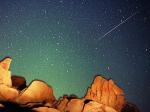 A Perseid Meteor
A Perseid Meteor
11.08.2004
The ongoing Perseid Meteor Shower should be at its strongest tonight and tomorrow night. Although meteors should be visible all night long, the best time to watch will be between 2:00 AM and dawn each night. In dark, moonless, predawn skies you may see dozens of meteors per hour.
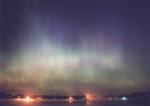 Aurora Persei
Aurora Persei
4.09.2000
Last month, skywatchers were treated to an unexpected coincidence: bright aurorae occurred during the Perseid Meteor Shower. The above picture was taken August 12 and captures eerie looking aurorae and a faint Perseid meteor above Cross Lake in Wisconsin, USA. The near future holds promise for both more aurorae and a better meteor shower.
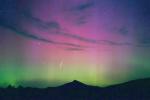 A Perseid Aurora
A Perseid Aurora
21.08.2000
Just after the Moon set but before the Sun rose in the early morning hours of August 12, meteors pelted the Earth from the direction of the constellation Perseus, while ions pelted the Earth from the Sun.
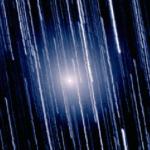 Tempel-Tuttle: The Leonid Comet
Tempel-Tuttle: The Leonid Comet
30.01.1998
Star trails streak this composite time exposure of Comet Tempel-Tuttle recorded by T. Puckett on January 26. Presently passing through the inner solar system on its 33 year orbit around the Sun, Tempel-Tuttle has brightened unexpectedly, but binoculars or small telescopes are still required to visually observe it.
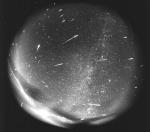 Leonids from Leo
Leonids from Leo
4.11.2001
Is Leo leaking? Leo, the famous sky constellation visible on the left of the above all-sky photograph, appears to be the source of all the meteors seen in 1998's Leonids Meteor Shower. That...
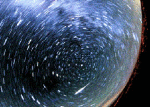 Leonid Meteor Shower Next Week
Leonid Meteor Shower Next Week
8.11.1998
Early next week, a spectacular meteor storm is expected: the 1998 Leonids. It is widely thought that that the meteors from the Leonids meteor shower are just small pieces of Comet Temple-Tuttle falling to Earth.
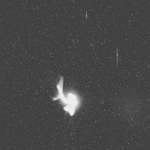 A Leonid Meteor Explodes
A Leonid Meteor Explodes
18.11.2001
Last night and tonight, a lucky few may see a meteor explode. As our Earth passes unusually close to debris expelled from Comet Tempel-Tuttle, many sand-sized particles from this comet are entering and burning up in the Earth's atmosphere.
 Leonids from Leo
Leonids from Leo
17.11.2002
Is Leo leaking? Leo, the famous sky constellation visible on the left of the above all-sky photograph, appears to be the source of all the meteors seen in last year's Leonids Meteor Shower.
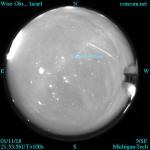 Leonid Meteors in 2002
Leonid Meteors in 2002
19.11.2002
All during today, APOD will be posting the best images of the Leonid Meteor Shower as seen by the wide-angle digital cameras perched around the world as part of the Night Sky Live (NSL) Project. The main APOD site will be updated several times with topical information and new images.
|
January February |
|||||||||||||||||||||||||||||||||||||||||||||||||